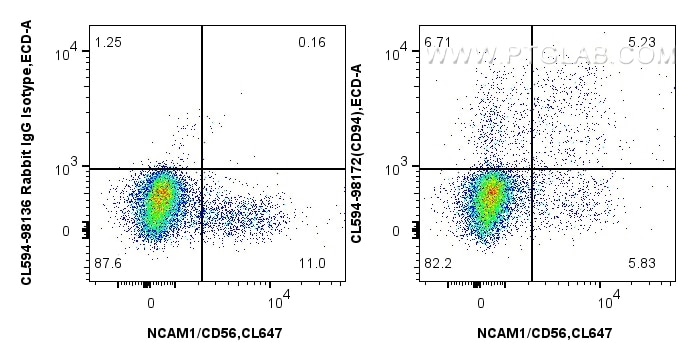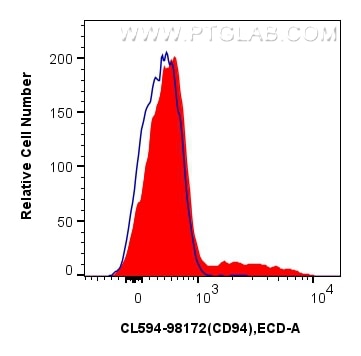Tested Applications
| Positive FC detected in | human peripheral blood leukocytes |
Recommended dilution
| Application | Dilution |
|---|---|
| Flow Cytometry (FC) | FC : 5 ul per 10^6 cells in a 100 µl suspension |
| This reagent has been pre-titrated and tested for flow cytometric analysis. The suggested use of this reagent is 5 ul per 10^6 cells in a 100 µl suspension or 5 ul per 100 µl of whole blood. | |
| Sample-dependent, Check data in validation data gallery. | |
Product Information
CL594-98172 targets CD94 in FC applications and shows reactivity with human samples.
| Tested Reactivity | human |
| Host / Isotype | Rabbit / IgG |
| Class | Recombinant |
| Type | Antibody |
| Immunogen |
Recombinant Protein Predict reactive species |
| Full Name | killer cell lectin-like receptor subfamily D, member 1 |
| Calculated Molecular Weight | 179 aa, 20 kDa |
| GenBank Accession Number | BC028009 |
| Gene Symbol | CD94 |
| Gene ID (NCBI) | 3824 |
| Conjugate | CoraLite®594 Fluorescent Dye |
| Excitation/Emission Maxima Wavelengths | 588 nm / 604 nm |
| Form | Liquid |
| Purification Method | Protein A purification |
| UNIPROT ID | Q13241 |
| Storage Buffer | PBS with 0.09% sodium azide and 0.5% BSA, pH 7.3. |
| Storage Conditions | Store at 2-8°C. Avoid exposure to light. Stable for one year after shipment. |
Background Information
CD94, also known as KLRD1, is a membrane protein that is preferentially expressed on NK cells. CD94 can form disulfide-bonded heterodimers with NKG2 family members. The CD94/NKG2A heterodimer constitutes an inhibitory receptor that recognizes HLA-E.
Protocols
| Product Specific Protocols | |
|---|---|
| FC protocol for CL594 CD94 antibody CL594-98172 | Download protocol |
| Standard Protocols | |
|---|---|
| Click here to view our Standard Protocols |






